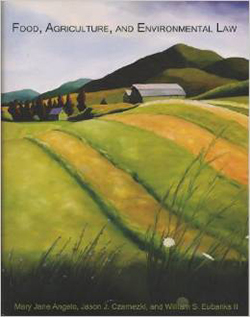- Home
- Food, Agriculture, and Environmental Law
Food, Agriculture, and Environmental Law
In the groundbreaking Food, Agriculture, and Environmental Law, leading environmental legal scholars Mary Jane Angelo, Jason Czarnezki, and Bill Eubanks, along with five distinguished contributing authors, undertake an exploration of the challenging political and societal issues facing agricultural policy and modern food systems through the lens of environmental protection laws. Through this exploration, the authors seek to answer difficult questions about the need for new approaches to agricultural policy and environmental law to meet 21st Century concerns surrounding climate change, sustainable agriculture, accessibility to healthy foods, and the conservation of natural resources and ecosystem services. This is the first book to examine both the impact of agricultural policy on the environment and the influence of environmental law on food and agriculture.
The authors present a brief historical overview of agricultural policy as it has adapted to satisfy shifting demands and new technologies, and its role in shaping not only the current farming system and the rural economy, but also the value which we ascribe to our natural resources relative to agricultural production. The authors then explain in detail the components of the current farm bill; analyze the ecological impacts of the modern farming system encouraged by our nation’s agricultural policy; and examine the interplay between agriculture, food production and distribution, and existing environmental and related laws. They conclude with several concrete proposals to reform agricultural policy that serve as models of how to enhance sustainability in our farming and food system.
This book supplies a comprehensive, timely, and cohesive guide on the intersection of agriculture and the natural environment. It achieves this goal through an interdisciplinary lens, engaging diverse perspectives to provide both a practical and academic examination of the environmental impacts of current farm policy, the applicability of environmental regulatory mechanisms to agriculture and food, and reform proposals to combat environmental harms while protecting farmers’ economic interests as well as the rural communities they bolster. As a result, this work serves as the quintessential text for bringing these issues to the classroom in a variety of fields, including law, public policy, agricultural economics, and environmental science.
Imprint: Environmental Law Institute
Series: Environmental Law Institute
Publication Date: 04/23/2013
Related Subject(s): Agriculture Law, Food And Drug Law
Mary J. Angelo, University of Florida College of Law
Jason Czarnezki, Pace University School of Law
Bill Eubanks, Vermont Law School
CasebookPlus™
This title is available in our CasebookPlus format. CasebookPlus provides support beyond your classroom lectures and materials by offering additional digital resources to you and your students. Anchored by faculty-authored formative self-assessments keyed to our most popular casebooks, CasebookPlus allows students to test their understanding of core concepts as they are learning them in class – on their own, outside of the classroom, with no extra work on your part. CasebookPlus combines three important elements:
- A new print or digital casebook
- Access to a downloadable eBook with the ability to highlight and add notes
- 12-month access to a digital Learning Library complete with:
- Chapter questions keyed to the casebook
- Black Letter Law questions (available in select subjects)
- Subject area review questions for end of semester use
Leading digital study aids, an outline starter, and audio lectures in select subjects
Students can still utilize CasebookPlus digital resources if they’ve purchased a used book or are renting their text by purchasing the Learning Library at westacademic.com.
With CasebookPlus, you can customize your students’ learning experience and monitor their performance. The quiz editor allows you to create your own custom quiz set, suppress specific quiz questions or quiz sets, and time-release quiz questions. Additionally, the flexible, customized reporting capability helps you evaluate your students’ understanding of the material and can also help your school demonstrate compliance with the new ABA Assessment and Learning Outcomes standards.
Learn more about this series.
Access Denied
Law School Faculty - Sign in or Create an Account to access this content. Law faculty who have created an account can sign in after receiving email notification that registration has been approved. Email accountmanager@westacademic.com or call 800-313-9378 for assistance.
Other Higher Education Faculty who wish to access digital review copies or teaching resources should contact their West Academic Account Manager at college@westacademic.com or 800-360-9378.
Adopters Only
This content is intended for adopters only. Sign in or Create an Account to access this content. Law faculty who have created an account can sign in after receiving email notification that registration has been approved. If you are an adopter who is unable to access this content after signing in, contact your account manager for assistance at accountmanager@westacademic.com or call 800-313-9378 for assistance.
Access Denied
Sign in or Create an Account to access this content. Faculty who have created an account can sign in after receiving email notification that registration has been approved. Contact us for assistance.
Law School Faculty: email accountmanager@westacademic.com or call 800-313-9378.
Other Higher Education Faculty: email college@westacademic.com or 800-360-9378.
Access Denied
Higher education faculty who wish to view this document should contact their West Academic Account Manager at college@westacademic.com or 800-360-9378.
